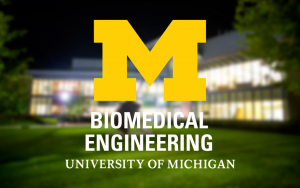Presented By: Biomedical Engineering
BME Seminar: Alexandra Rutz
“Materials and manufacturing for seamless bioelectronic-tissue interfaces”

Remarkable advances in medicine and biology have been made possible with bioelectronics – devices that bridge and connect the worlds of living systems and electronics. Bioelectronics include wearable sensors for health monitoring, in vitro diagnostics, therapeutic implantable devices, and electrical stimulation for tissue engineering and regeneration. Despite their influence, bioelectronic devices are still limited by the fact that they are disparate and distinct from biology. The quality of the device-tissue interface is poor and diminishes with time; this is thought to be due to many factors including significant surgical trauma, an aggressive foreign body response, poor material compatibility with the biological milieu, as well as imprecise and distant connections between electronics and surrounding cells or tissues. Towards addressing these challenges, I will first present the use of slippery surfaces for mitigating the consequences of implanting bioelectronics into delicate tissues. I will demonstrate how liquid-infused elastomers reduce tissue deformation and tearing associated with the insertion of intracortical probes in rats. I will then present how, unlike typical electronic fabrication processes, additive manufacturing is compatible with biomaterials and cells. I will demonstrate that when “inks”, processing methods, and scaffold structure are engineered appropriately, extrusion-based 3D printing affords patterned, viable, and functional cell networks, and I will discuss how this can be exploited in future bioelectronic devices. To conclude, I will briefly present my vision to continue tackling the pressing challenges of biointegration that bioelectronics face in expanding their clinical and scientific impacts. The Rutz Lab will engineer “electronic tissues” that merge electronics and biology using additive manufacturing and biomaterials approaches.